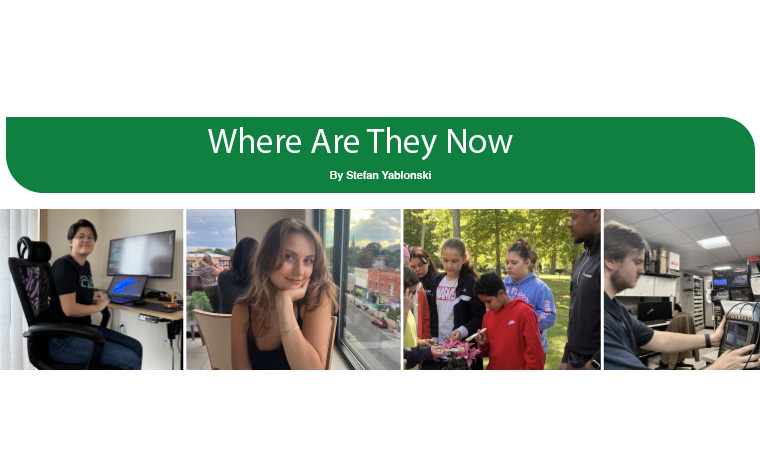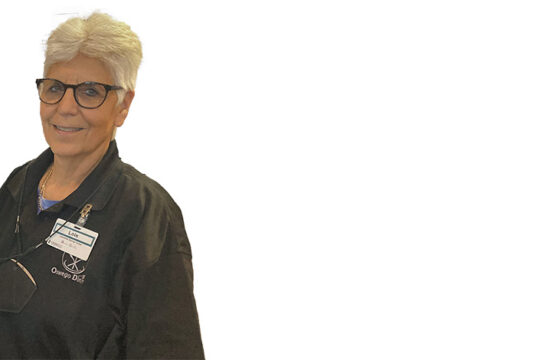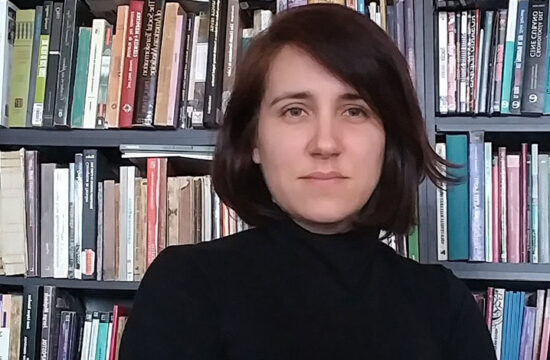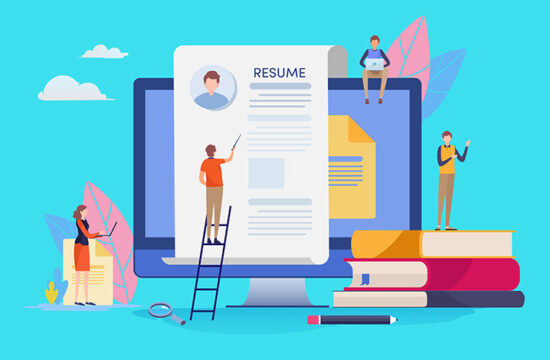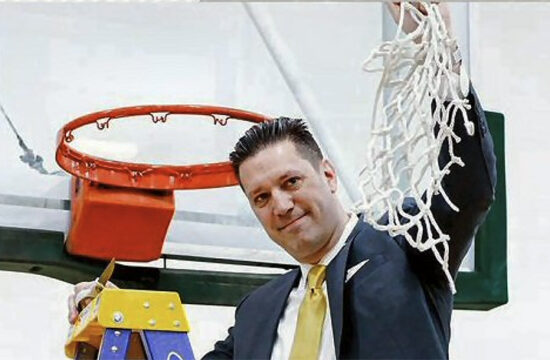By Deborah Jeanne Sergeant
Do you keep up with classmates who graduated before you?
Maybe you spot them online occasionally and see what they’re up to.
Perhaps you still text a few particularly close college friends who graduated before you.
But do you ever wonder how the class is doing overall (and by extension, how things will go for you once you earn your diploma)?
Gary Morris, director of Career Services at SUNY Oswego, shared a few statistics on how Oswego’s class of 2022 is making it in the workforce.
If you’re wondering about the class of 2023, you’ll have to wait a bit for that information.
“We collect data on each class within one year of graduation,” Morris explained. “As a result, our latest solid data is from the class of 2022.
“Over the past decade, our numbers have been remarkably consistent, although the class of 2022 hit a highwater mark for positive launches.”
The class of 2022 has enjoyed a 99% rate of employment or continuing their education — a positive sign that their education is paying off.
Of those currently employed or seeking further education, 77% are employed and 12% are continuing their education. An ambitious 10% is both employed and seeking further education.
Of course, when you take the time and resources to study in a particular field, you want to land employment in that field (that’s the goal, right?). Morris related that of the class of 2022, 91% are working full-time in their chosen field.
If you’re concerned about your employability, Morris encourages a stop at the Career Services Office. The advisers can help you develop strategies that can increase your chances of getting employment. They can also talk with you about whether seeking further education would help you advance your career.
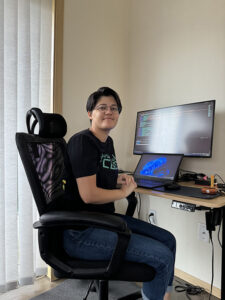 Anisha KC
Anisha KC
Software Engineer, Microsoft
She was part of the graduating class of 2022 at SUNY Oswego, majoring in computer science. Now she is a software engineer.
“I came to land the job through an internship. I had interned with Microsoft the previous summer and got a return offer to come back as a full-time employee after my graduation,” she said. “When applying for the internship, I just applied online through their website. I had one previous internship experience which might have helped me get past the resume screening process.”
“Currently, I am working on a team that helps network engineers by providing valuable data and visualization of Microsoft’s network and any issues in it,” she explained.
She said she chose this field “because I like solving problems and building stuff, which is what most of my job entails.”
“I think the SUNY Oswego experience was pretty helpful. There were some specific classes like CSC380 and CSC480 which I think were the most helpful. They resembled the closest to what work after college actually looked like — a lot of collaboration and working together to solve a problem,” she added.
The internship was also very helpful in preparing her.
“The project I worked on was not related at all to what I work on now; but it was helpful in introducing me to the work culture and the different tools that are used across the whole company,” she said.
Her main advice for other students who want to land a software engineer job is to prepare for the interviews.
“You can use websites like Leetcode and Hackerrank to help prepare for some of the technical interviews. For behavioral interviews, I would look up some common questions and think of different situations that could apply to it,” she said. “You can also do practice interviews with friends which can be helpful.
“I would also encourage them to work on side projects where they build things for fun while learning. This is really helpful early on when you don’t have experience and can instead put the projects on your resume and talk about what you learned from those instead. This is especially helpful when trying to land your first internship. After getting the first internship experience, landing another internship or a full-time offer gets a little easier since you have some experience already.”
If applying for summer internships, she suggested preparing during the summer before and apply during fall and continue during spring if an offer hasn’t been secured.
“That might seem really early, but a lot of companies open up their internship application a whole year before and some even close by the end of fall semester,” she said. “This helps maximize the companies that you can apply to (that you are interested in). Also, every interview is a learning experience for you to improve your interview skills.”
 Isabela Ymaj
Isabela Ymaj
AdSales at NBC
Isabela Ymaj, SUNY Oswego Class of 2022, works in AdSales at NBC.
“Media was something I was always interested in,” she said.
Her experience at SUNY Oswego (and internship) was very helpful in preparing her for the job, she said with an emphatic ‘yes!’
“I’ve been to three schools: Parsons, Syracuse and Oswego. Out of all three, Oswego was the school that really gave me a sense of community and support,” she added.
“One thing that helped me the most is my media management class at Oswego. It was kind of what led me to where I am now,” she continued. “James Lerch, a professor at Oswego, gave us a project where we had to create our own radio station and that was when I fell in love with media. It may not be what I’m doing now (which is commercials) but it made me want to be around it more.”
She also joined the Aephi sorority (Alpha Epsilon Phi – Aephi) a national sorority on campus.
“I was a bit hesitant about it at first. But in the end it gave me really good leadership-communication skills that I use to this day,” she said.
She was in charge of the social media and it played a part in her interest for communications and entertainmentmedia, she explained.
“What’s nice is that it wasn’t too big of a sorority where I felt like I couldn’t make a difference,” she said.
What advice does she have for other students preparing for a job search?
“Networking is key. I always tell some students to just go for it, you have nothing to lose. The worst thing that’ll happen is you get left on read. Usually students reach out via LinkedIn and sometimes get left on read by some professionals. When I was looking for a job it was kind of hard to be ghosted or left on read by some professionals. It felt like I was going nowhere. But it all worked out in the end!”
“Also to just never give up! As clichéd as that sounds, it’s true. Your enthusiasm, positive outlook and hunger for knowledge will be noticed,” she added. “Prepare as soon as your senior year starts. You may think it’s too early, but it’s better to be prepared. I’m still starting off in this field. So I’m still learning and trying my best as I go along.”
Salary depends on what entry level job you take within media. Depending on the corporation, it ranges from $50k – $60k.
David Victome
environmental specialist for Constellation (Nine Mile Point Nuclear station)
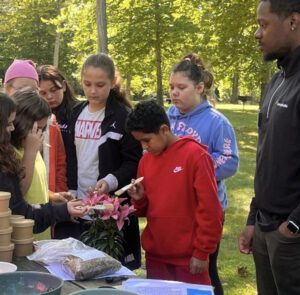
David Victome graduated from SUNY Oswego in 2021 with a bachelor’s in geology and a concentration in environmental studies.
An important part of his development was the graduation requirements, he said.
“The program I was in required either a capstone or internship. I chose the latter,” he explained.
He spent the summer after his final semester working as an air technician at a small environmental consultancy.
“The primary functions of my role as an air tech there didn’t necessarily align with what I learned in the classroom. However, I took it upon myself to ask for more involvement on other projects,” he said.
Eventually, he was able to shadow alongside the drilling crew.
“I got to join them as they did drilling and soil classifications as a part of phase I/II environmental site assessments (ESAs),” he said. “From there I learned that there is much more that I can do with my degree than what I originally thought.”
A few months after graduating, he found a full-time position as a hydrogeologist at P.W. Grosser. He got to work on so many different projects and learn a lot about the environmental field, he added.
“I spent a year providing oversight for phase I/II assessments and other remediation work before accepting my current role as an environmental specialist,” he said.
He began working as an environmental specialist for Nine Mile Point Nuclear Station at the end of 2022.
“At no point during my undergrad years did I think that working at a nuclear power plant would be the perfect fit for what I was looking for in a career,” he said.
He currently manages the environmental compliance and water programs for the site.
“Outside of the plant, I also get to work outdoors a lot for our environmental stewardship program. We do various things there like eagle monitoring, providing presentations and sponsorships with the local community and many other fun outdoor programs!” he said.
“My story isn’t necessarily a special one; but I believe it’s pretty fitting for the modern-day professional audience. Finding a job in your field right out of college can be challenging and very frustrating,” he added.
During his final semester of undergrad, he spent at least an hour every day Googling potential career paths.
“’What can you do with a geology degree?’ was easily #1 in my search history,” he said. “None of the career choices that I have made appeared in those searches. But I was able to advance my career early by getting introduced to the environmental field and continuing my learning through experience.”
The single greatest skill that he has developed is communication, he added.
“Knowing how to talk, and more importantly, listen to people has been an intangible asset for me. You learn so much from your daily interactions that it eventually helps shape you to become the best version of yourself,” he said.
“I owe my current success to being open to foreign opportunities and taking risks. I packed up all my things and moved 300 miles to work at a place I’ve never heard of — doing a job I never even knew existed. And it was the best decision that I ever made.”
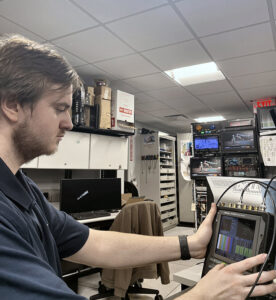 Marek Ptakowski
Marek Ptakowski
Engineer, MLB/NHL Network
Marek Ptakowski finished his undergraduate degree in spring ‘23 with a broadcasting and mass communication degree.
“I’m currently pursuing my MBA online with SUNY Oswego as well,” he said.
While at Oswego, he was a part of the television station WTOP 10. He started off as an engineer.
“I was able to work my way up to vice president of engineering in 2021 and became the club’s general manager for the 2022-23 academic year,” he said.
Currently, he is a broadcast engineer at the MLB/NHL Network located in Secaucus, New Jersey.
“My role is centered on supporting all aspects of productions including control rooms, studios and broadcast equipment. Our team is the first to respond to issues that may arise before, during or after production,” he explained. “I also help to install, configure and maintain all types of equipment both in studio and behind the scenes.
At the MLB/NHL Network, I’m one of the people helping to maintain critical infrastructure to keep the broadcast on air.”
The production staff will alert him and his team of any issues that may affect the on air product.
“My job is to communicate with the operator or production staff who reported the issue, diagnose the problem and curate-implement potential solutions all on a strict timeline,” he explained. “I work with all types of equipment such as computers, production switchers, intercom panels, servers, cable termination, set-studio displays and so much more.”
They have live programming every day — “so we have to always remain on our toes 24/7 to ensure the station remains up and running,” he said.
He was able to land this job via LinkedIn, “but I also had a connection within the engineering department who was also a former SUNY Oswego student,” he added.
He had wanted to be in the broadcasting/tech industry since taking up the AV club at his local middle school.
“My brother and I helped to build their current studio from the ground up. So I knew I wanted to work in the industry in some fashion,” he said. “I didn’t know I wanted to become an engineer until I started at SUNY Oswego. My first role in the student television station WTOP 10 was the assistant sports engineer in 2019, where I was able to learn the essential skills for broadcast engineering. After gathering a greater understanding of signal flows and how each piece of equipment plays a role in our productions, I was able to continue to evolve within the club and in the classroom.”
A lot of his learning was done outside of the classroom with hands-on experience working with WTOP 10, “that’s where I really found my passion and future career path,” he added.
He said he is “very grateful” for the SUNY experience.
“Being an out-of-state student, it was a bit of a different experience. I didn’t know a single student on campus my first day. That first day, the community really embraced me and made me feel like I was at home,” he said. “I was enrolled in a GSL community service class my first semester with other broadcasting students — little did I know that I’d create life-long friendships and memories with all of those students for the next four years.”
The broadcasting program at SUNY Oswego is unlike any other, “as we have opportunities to directly apply the lessons taught in class to the real world,” he said.
While he was still a student, he landed several freelance broadcasting jobs which included: sideline utility at ESPN Monday Night Football, Sideline Utility st ACC Syracuse football, audio engineer II for Spectrum Sports high school football — and he spent the entire summer with ESPN World Wide of Sports in Orlando, Florida as a broadcast engineer.
“Having the access to all of these opportunities helped tremendously to prepare for the real world. I was able to work with professionals in the classroom with all types of expertise who passed their knowledge onto me,” he said. “It’s one thing to be lectured about a topic, but to then be able to apply those principles and experience the lessons in a professional environment helped catapult my success at SUNY Oswego.
“I can’t emphasize enough just how important networking has been in my journey so far. I’ve been able to meet so many different professionals with a variety of backgrounds. They each have played a valuable role in my development and have led to some really cool opportunities. Making sure you’re always creating new relationships and maintaining old ones can help you further advance your skill sets and knowledge. It’s important to also create those networks amongst your fellow students with similar interests, as you never know where they may end up or what they might experience in the future.”
The salary range is around $60,000 – $95,000 annually depending on the location/scale of the facility.



